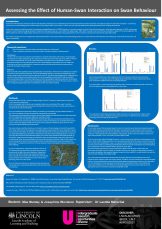By Josephine Woolston & Mae Stanley //


Mute swans residing in urban areas are often exposed to supplementary, unnatural food fed by humans. Though foodstuff such as bread is not toxic to mute swans, excessive amounts can cause multiple health problems especially if the bread is mouldy. Moreover, the act of feeding increases the dependence swans have on humans for survival. These factors contribute to the negation in the welfare of the species.
Thus, over the course of the summer, we set out to explore the effects that human-swan interactions, in Lincoln and surrounding areas, have on swan feeding behaviours. Further, whether there were gender differences in the frequency of feeding behaviours was to be examined.
This led to two main research questions:
1. Do human-swan interactions affect natural swan feeding behaviour?
2. Does gender influence the frequency of swan feeding?
As expected, findings showed that swans residing in waterways close to the city centre and public parks experienced the most human-swan interactions. During times wherein no human-animal interactions were occurring, swans tended to feed on pondweed and algae. Whereas when human-swan interactions did occur, swans most commonly fed on bread provided by humans. Furthermore, over the course of the six weeks, females interacted and fed swans more frequently than males.
 As human-swan interactions often occur in such way that involves feeding, people should be educated on the consequences of feeding swans supplementary food. Signs in busy public areas, such as parks, could be built to inform people about food that is not suitable for swans. This could prevent potential welfare issues. Additional information on indicators that a swan is distressed would also ensure safety of both the human and swan.
As human-swan interactions often occur in such way that involves feeding, people should be educated on the consequences of feeding swans supplementary food. Signs in busy public areas, such as parks, could be built to inform people about food that is not suitable for swans. This could prevent potential welfare issues. Additional information on indicators that a swan is distressed would also ensure safety of both the human and swan.
The main challenges of this project presented themselves whilst carrying out the fieldwork. The main setback we both encountered was falling ill with Covid-19, thus disrupting the schedule that was laid out for data collection. However, with the support of other students on a similar research project, plentiful data was collected. Other more manageable challenges included weather conditions, which presented their own challenges. For example, we had to be cautious not to damage any of the equipment whilst filming in the rain. To overcome this issue, the video camera was only ever used whilst under a waterproof cover. Although sightings were often recorded on each day, on occasion we struggled to locate any swans at all. Though this meant that no data was collected on some days, this is often the nature of fieldwork.
Collaborating with other likeminded students and our supervisor, Laetitia Marechal, provided us with greater knowledge further enhancing our experience. The new skills and deeper knowledge acquired from working on this UROS project will aid our further study as we transition into third year. In particular, data handling skills and techniques such as navigating excel, will be beneficial as we take on our third-year dissertation. Further, organisational skills that we acquired during the process of our UROS project will be transferable to our final year at university.
*To view Josephine & Mae’s research poster and presentation recording, please click on the thumbnails below:
